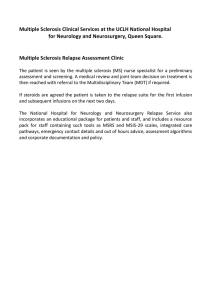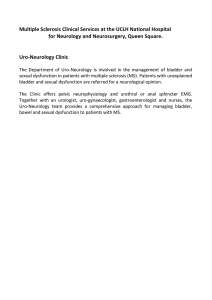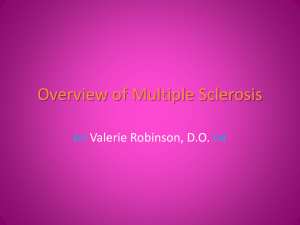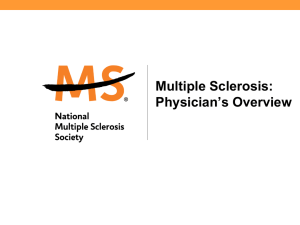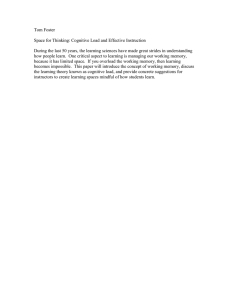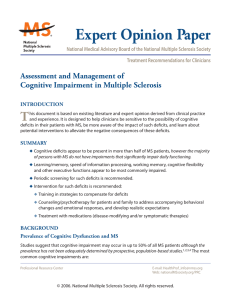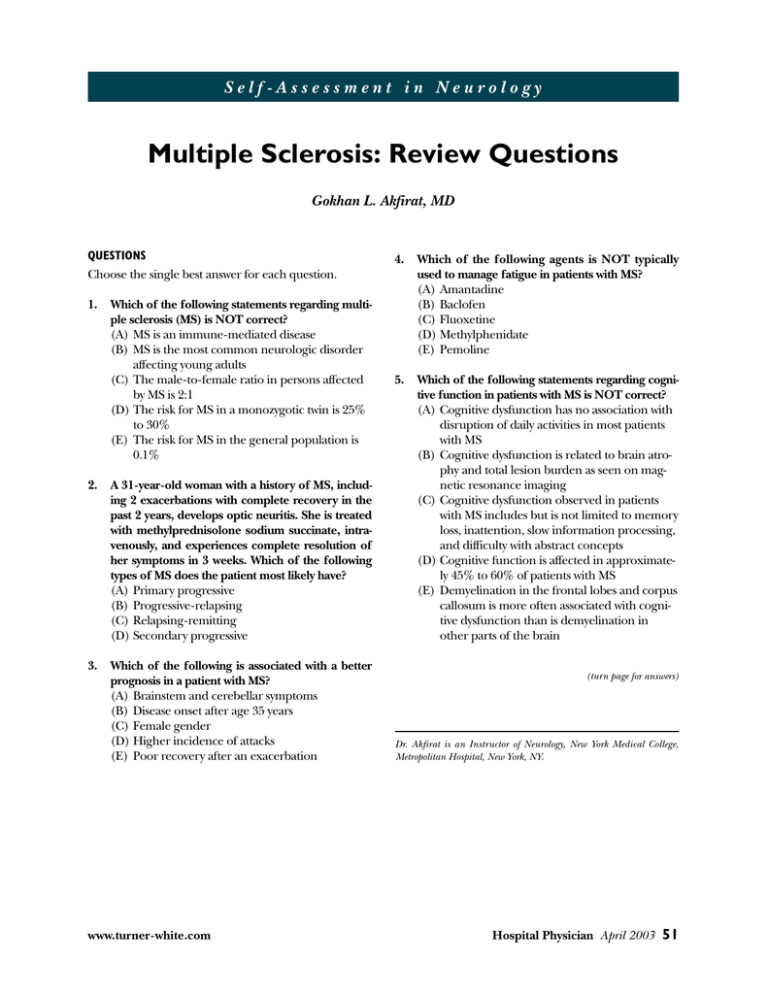
Self -Assessment in Neurology
Multiple Sclerosis: Review Questions
Gokhan L. Akfirat, MD
QUESTIONS
Choose the single best answer for each question.
1.
Which of the following statements regarding multiple sclerosis (MS) is NOT correct?
(A) MS is an immune-mediated disease
(B) MS is the most common neurologic disorder
affecting young adults
(C) The male-to-female ratio in persons affected
by MS is 2:1
(D) The risk for MS in a monozygotic twin is 25%
to 30%
(E) The risk for MS in the general population is
0.1%
2.
A 31-year-old woman with a history of MS, including 2 exacerbations with complete recovery in the
past 2 years, develops optic neuritis. She is treated
with methylprednisolone sodium succinate, intravenously, and experiences complete resolution of
her symptoms in 3 weeks. Which of the following
types of MS does the patient most likely have?
(A) Primary progressive
(B) Progressive-relapsing
(C) Relapsing-remitting
(D) Secondary progressive
3.
Which of the following is associated with a better
prognosis in a patient with MS?
(A) Brainstem and cerebellar symptoms
(B) Disease onset after age 35 years
(C) Female gender
(D) Higher incidence of attacks
(E) Poor recovery after an exacerbation
www.turner-white.com
4.
Which of the following agents is NOT typically
used to manage fatigue in patients with MS?
(A) Amantadine
(B) Baclofen
(C) Fluoxetine
(D) Methylphenidate
(E) Pemoline
5.
Which of the following statements regarding cognitive function in patients with MS is NOT correct?
(A) Cognitive dysfunction has no association with
disruption of daily activities in most patients
with MS
(B) Cognitive dysfunction is related to brain atrophy and total lesion burden as seen on magnetic resonance imaging
(C) Cognitive dysfunction observed in patients
with MS includes but is not limited to memory
loss, inattention, slow information processing,
and difficulty with abstract concepts
(D) Cognitive function is affected in approximately 45% to 60% of patients with MS
(E) Demyelination in the frontal lobes and corpus
callosum is more often associated with cognitive dysfunction than is demyelination in
other parts of the brain
(turn page for answers)
Dr. Akfirat is an Instructor of Neurology, New York Medical College,
Metropolitan Hospital, New York, NY.
Hospital Physician April 2003
51
Self -Assessment in Neurology : pp. 51 – 52
EXPLANATION OF ANSWERS
1. (C) The male-to-female ratio of persons affected
by MS is 2:1. On the contrary, the female-to-male
ratio in multiple sclerosis (MS) is approximately 2:1.
MS is an immune-mediated inflammatory disease
and is the most common neurologic disorder affecting young adults. It affects millions worldwide and
approximately 400,000 in the United States alone.
Whereas the risk for MS occurring in the general
population is 0.1%, the risk is 25% to 30% for MS
occurring in a monozygotic twin and 3% to 5% in a
dizygotic twin.1 – 3
2. (C) Relapsing-remitting. Relapsing-remitting MS
describes disease relapses with full or partial recovery.
The periods between relapses are characterized by a
lack of disease progression. Patients with primaryprogressive MS experience disease progression from
disease onset, with occasional, temporary, and minor
episodes of improvement. Progressive-relapsing MS
is a progressive disease from disease onset, but there
are clear acute relapses with or without recovery.
The periods between relapses are accompanied by
disease progression. Secondary-progressive MS
begins with a relapsing-remitting course followed by
progression with or without occasional relapses without full recovery.3
3. (C) Female gender. The prognosis for men with MS
is poorer than for women. Other poor prognostic
factors include cerebellar and brainstem symptoms,
onset of disease after age 35 years, higher incidence
of attacks, poor recovery after an exacerbation, progressive course from onset, and higher lesion load
on magnetic resonance imaging (MRI).3,4
4. (B) Baclofen. Approximately half of patients with
MS experience fatigue. Amantadine, fluoxetine,
methylphenidate, and pemoline are used to treat
fatigue, whereas baclofen is used to treat spasticity.
The new agent modafinil, approved for treatment
of patients with narcolepsy, has also been shown to
ameliorate fatigue.5
5. (A) Cognitive dysfunction has no association with
disruption of daily activities in most patients with
MS. Cognitive impairment refers to adverse changes
in high-level brain functions, such as language, visual perception and construction, calculation ability,
attention, memory, and executive functions (eg,
planning, problem solving, self-monitoring). This
impairment is observed in approximately 45% to
60% of patients with MS. Cognitive dysfunction is
related to brain atrophy and total lesion burden on
MRI, and demyelination in the frontal lobes and
corpus callosum is more often associated with cognitive dysfunction than is demyelination in other parts
of the brain. There is little or no correlation with
disease severity or duration.6
REFERENCES
1. Compston A, Coles A. Multiple sclerosis [published
erratum appears in Lancet 2002;360:648]. Lancet 2002;
359:1221–31.
2. Noseworthy JH, Lucchinetti C, Rodriguez M, Weinshenker BG. Multiple sclerosis. N Engl J Med 2000;343:
938–52.
3. Keegan BM, Noseworthy JH. Multiple sclerosis. Annu
Rev Med 2002;53:285–302.
4. Weinshenker BG, Rice GP, Noseworthy JH, et al. The
natural history of multiple sclerosis: a geographically
based study. 3. Multivariate analysis of predictive
factors and models of outcome. Brain 1991;114(Pt 2):
1045–56.
5. Rammohan KW, Rosenberg JH, Lynn DJ, et al. Efficacy
and safety of modafinil (Provigil) for the treatment of
fatigue in multiple sclerosis: a two centre phase 2 study.
J Neurol Neurosurg Psychiatry 2002;72:179–83.
6. Bagert B, Camplair P, Bourdette D. Cognitive dysfunction in multiple sclerosis: natural history, pathophysiology and management. CNS Drugs 2002;16:445–55.
Copyright 2003 by Turner White Communications Inc., Wayne, PA. All rights reserved.
SELF-ASSESSMENT QUESTIONS ON THE WEB
Now you can access the entire Self-Assessment Series on the Web. Go to www.turner-white.com, click on the
“Hospital Physician” link, and then click on the “Self-Assessment Questions” option.
NEUROLOGY
A current list of certification and recertification exam dates and registration information is
maintained on the American Board of Psychiatry and Neurology Web site, at http://www.abpn.com.
52 Hospital Physician April 2003
www.turner-white.com

